Middle East
My nephew asks if he will eat meat only in heaven. I struggle to answer | Israel-Palestine conflict
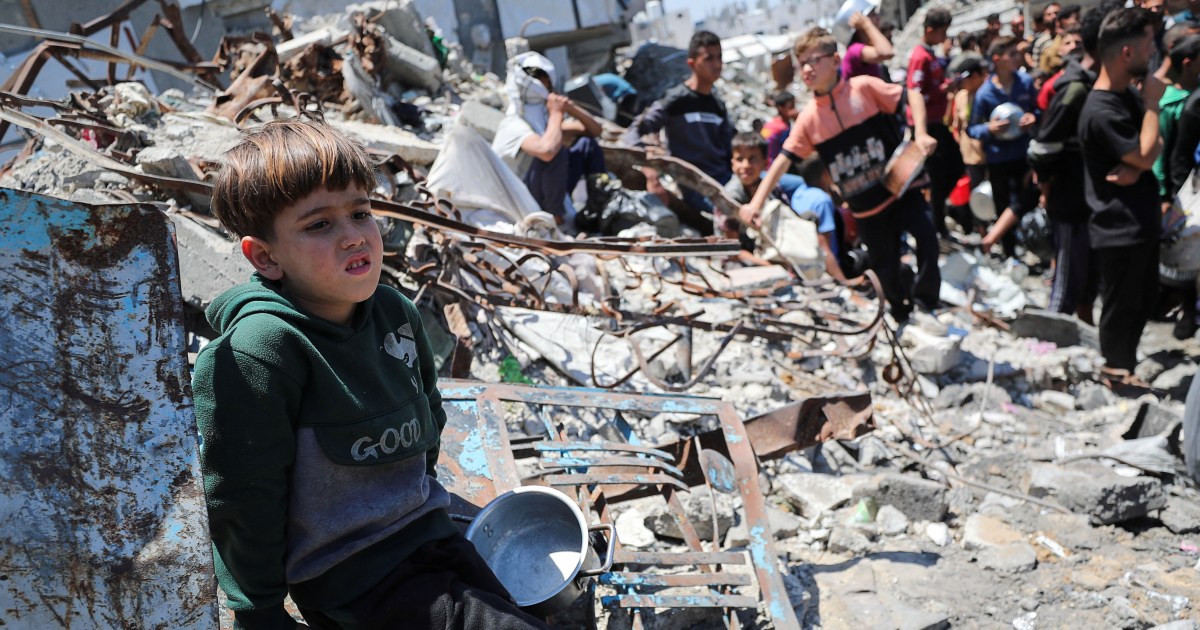
When on March 2, we heard all crossings into Gaza were closed, we thought it would not last more than two weeks. We really wanted a normal Ramadan where we could invite our surviving relatives for iftar and not worry about what food we could find to break our fast.
But it did not turn out this way. We spent the holy month breaking our fast with canned food.
My family, like most families in Gaza, had not stocked up on food or essentials, as no one expected the crossings to close again, or the famine – or even the war – to return.
In the days after the closure, food and other basic goods disappeared from the markets, and prices skyrocketed. A kilogramme of any vegetable jumped to $8 or more, sugar $22 and baby formula $11. A sack of flour previously costing $8, went up to $50; within two months, it reached $300.
Most people in Gaza could not afford these prices. As a result, families, including my own, began reducing the number of meals they eat, limiting themselves to just breakfast and dinner, and shrinking each person’s portion – half a loaf of bread for breakfast a whole one for dinner. Men, women, elderly people and children would stand in front of bakeries and charity kitchens for hours, in shame and sorrow, just to get a few loaves of bread or a small plate of food. For some families, this would be their only food for the day.
All the residents of central Gaza, where I live, relied on only three bakeries: two in Nuseirat and one in Deir el-Balah.
The crowds at these bakeries were overwhelming, blocking roads and halting movement in the area. Every day, there were cases of fainting and suffocation due to the pushing and shoving. In the end, only a small number of those who waited since morning would get bread.
My father would go to the bakery before sunrise to line up, instead of using what’s left of our flour, because we did not know how long this situation would last. But he would find the line already long, dozens having slept outside the bakery. He would stay until noon, then send my brother to take his place in the line. In the end, they would return with nothing.
On March 31, the World Food Programme announced the closure of all of its bakeries, including the three we could access, due to the depletion of flour and the lack of gas needed to run the ovens. This marked the start of true famine.
Soon, charity kitchens started closing as well because they ran out of food stock. Dozens of them shuttered in the past week alone. People grew even more desperate, many taking to local groups on Facebook or Telegram to beg for anyone to sell them a bag of flour at a reasonable price.
We live in a “lucky” neighbourhood where the kitchen still functions.
My niece Dana, who is eight years old, lines up in front of it every day with her friends, waiting for her turn as if it were a game. If she receives a single scoop of food, she comes back running, feeling very proud of herself. And if her turn doesn’t come before the food runs out, she returns in tears, complaining about how unfair this world is.
One day during Ramadan, a boy, displaced with his family to the al-Mufti School near our home, was so desperately trying to get food that he fell into the pot of hot food the charity kitchen was cooking. He suffered severe burns and later died from them.
The signs of famine began becoming apparent everywhere about a month and a half after the closure of the crossings. We see them in every aspect of our lives – sleeping on an empty stomach, rapid weight loss within, pale faces, weak bodies. Climbing stairs now takes us twice the effort.
It has become easier to get sick and more difficult to recover. My nephews, 18-month-old Musab and two-year-old Mohammed, developed high fever and flu-like symptoms during Ramadan. It took them a whole month to get better because of the lack of food and medicine.
My mother has been suffering from severe vision loss due to complications after eye surgery she had in late February. The malnutrition and the lack of eye drops she needed to recover have made her condition much worse.
I myself have been unwell. I donated blood to al-Awda Hospital in Nuseirat just days before the border was closed and this seriously affected my physical health. Now, I suffer from extreme weakness in my body, weight loss and difficulty focusing. When I went to the doctor, he told me to stop eating canned food and to eat more fruit and meat. He knew that what he was saying was impossible to do, but what else could he say?
Perhaps the most difficult part about this situation is having to explain famine to little children. My nieces and nephews cannot stop asking for things to eat that we simply cannot provide. We struggle to convince them that we are not punishing them by hiding food, but that we simply do not have it.
Five-year-old Khaled keeps asking for meat every day while looking at food pictures on his mother’s phone. He stares at the images and asks whether his martyred father gets to eat all this in heaven. Then he asks when his own turn will come, to join his father and eat with him.
We struggle to answer. We tell him to be patient and that his patience will be rewarded.
I feel helpless seeing daily scenes of famine and desperation. I ask myself, how can the world stay silent while seeing children’s bodies go thin and fragile and the sick and injured die slowly?
The occupation uses every method to kill us – by bombing, starvation, or disease. We have been reduced to begging for a piece of bread. The entire world watches and pretends that it cannot even give us that.
The views expressed in this article are the author’s own and do not necessarily reflect Al Jazeera’s editorial stance.
Middle East
Israel capitalises as Gaza fatigue sets in | TV Shows
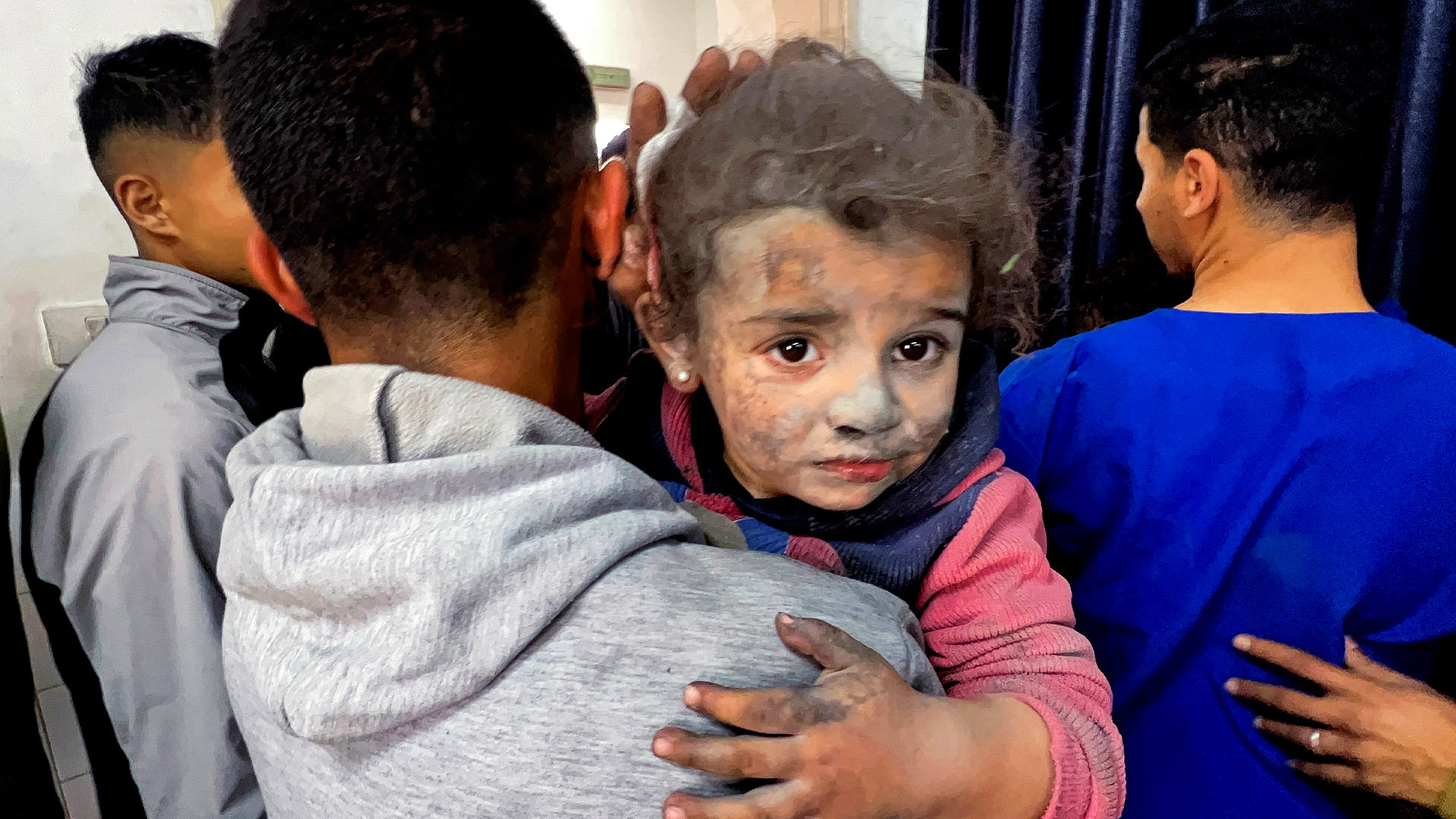
One might think that images of starving children, as political leaders withhold aid and openly call for ethnic cleansing, would be topping news agendas everywhere. In the case of Gaza, the failure of many in the international media to meet the moment has made them part of the story.
Lead contributors:
Chris Doyle – Director, Council for Arab-British Understanding
Daniel Levy – President, US/Middle East Project
Muhammad Shehada – Visiting fellow, ECFR
Sarah Leah Whitson – Director, DAWN
On our radar:
As India and Pakistan go toe-to-toe in their most intense fighting for decades, a flood of disinformation is fuelling the sense of panic on both sides. Meenakshi Ravi reports.
Seeking justice on Ghana’s courtroom shows
If you are dealing with something personal and painful – a broken marriage or a family dispute – you might turn to a friend. For something as serious as sexual assault, it might go to trial. But in Ghana, more and more people are turning somewhere else: live radio. The so-called “justice-style” shows promise swift, public resolutions. But they are also controversial, with critics accusing them of turning private pain into primetime theatre.
Featuring:
George Sarpong – Executive secretary, National Media Commission
Menenaba – Ghanaian writer
Oheneni Adazoa – Host, Sompa Nkomo Show
Zakaria Tanko Musah – Lecturer in media law and ethics, Journalism Institute
Middle East
Israeli protesters in Tel Aviv demand an end to war on Gaza | Israel-Palestine conflict News
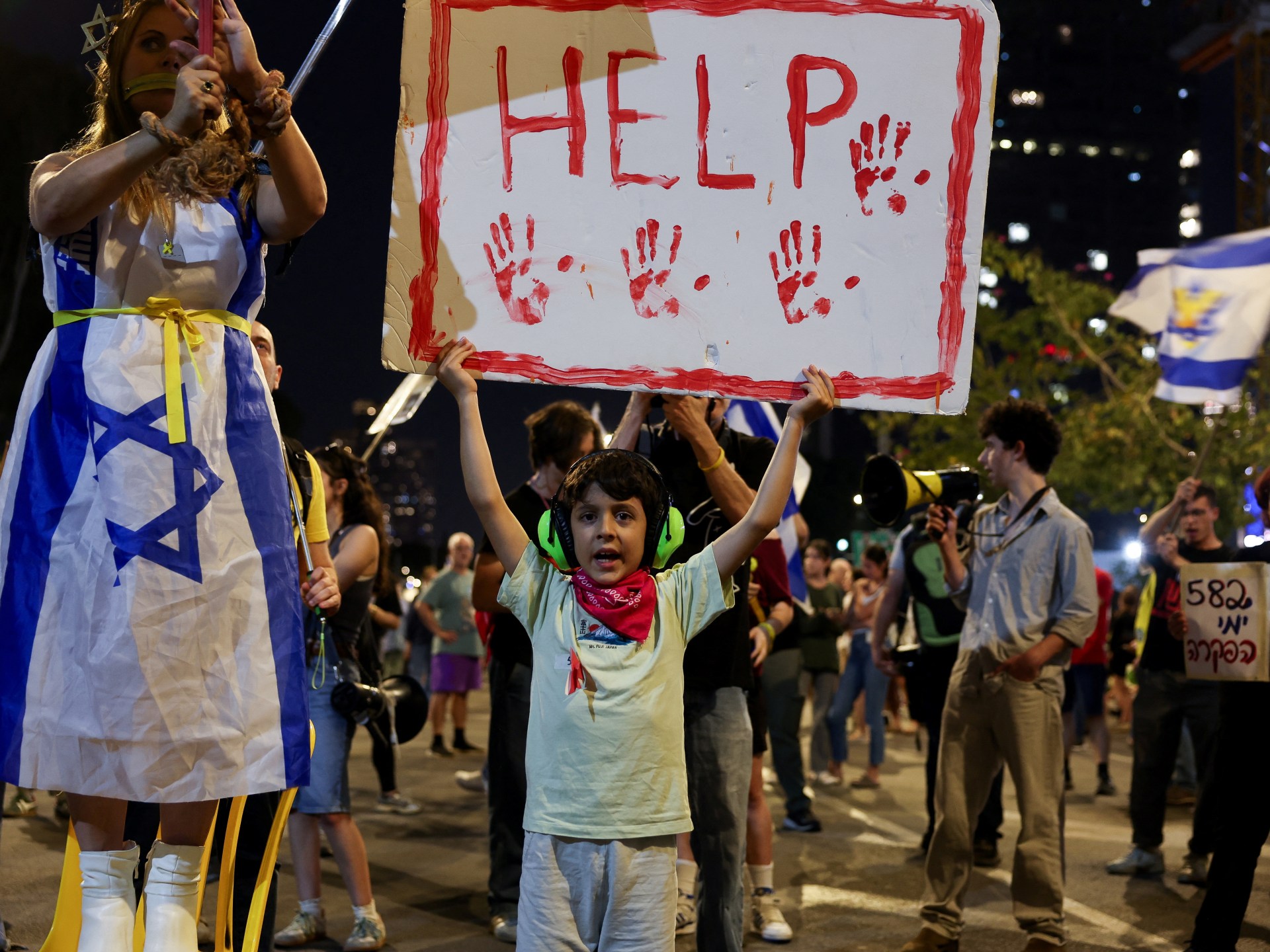
Thousands gather demanding an end to the war and the release of Israeli captives in Gaza.
Thousands of Israelis rallied in central Tel Aviv, calling on the government to end the war on Gaza and secure the immediate release of Israeli captives held in the besieged Palestinian enclave.
The Israeli newspaper Haaretz reported that in Tel Aviv, the Hostages and Missing Families Forum, an Israeli campaign group, held its weekly rally Saturday in “Hostages Square”, while another demonstration by families of captives is taking place outside the Israeli military headquarters.
A separate antigovernment protest is also occurring at Habima Square in Tel Aviv.
The Times of Israel reported that Shai Mozes, whose parents were held captive and released in separate exchange deals, told the crowd at the protest in Habima Square that Israel’s “real enemy is not Hamas, but Prime Minister Benjamin Netanyahu, who is destroying Israel as a Jewish and democratic state”.
Netanyahu’s critics in Israel have accused the prime minister of extending the war for his own personal and political survival.
Haaretz also reported that protests are expected in other cities, including Jerusalem, Haifa, and Beersheba, as well as at dozens of other sites and intersections across Israel.
After Netanyahu announced an expanded offensive in the Gaza Strip on Monday, the Hostages and Missing Families Forum criticised the move in a statement, saying the plan is “sacrificing” those still held in the Palestinian territory.

Hamas releases video of two Israeli captives alive in Gaza
Hamas’s armed wing released a video on Saturday showing two Israeli captives alive in the Gaza Strip, with one of the two men calling to end the 19-month-long war.
Israeli media identified the pair in the undated video as Elkana Bohbot and Yosef Haim Ohana.
The three-minute video released by Hamas’s Qassam Brigades shows one of the captives, identified by media as 36-year-old Bohbot, visibly weak and lying on the floor wrapped in a blanket.
Ohana, 24, speaks in Hebrew in the video, urging the Israeli government to end the war in Gaza and secure the release of all remaining captives.
Bohbot and Ohana were both abducted by Palestinian fighters from the site of a music festival during Hamas’s attack on southern Israel on October 7 2023.
Middle East
At least 33 people killed in suspected RSF attacks in Sudan | Sudan war News
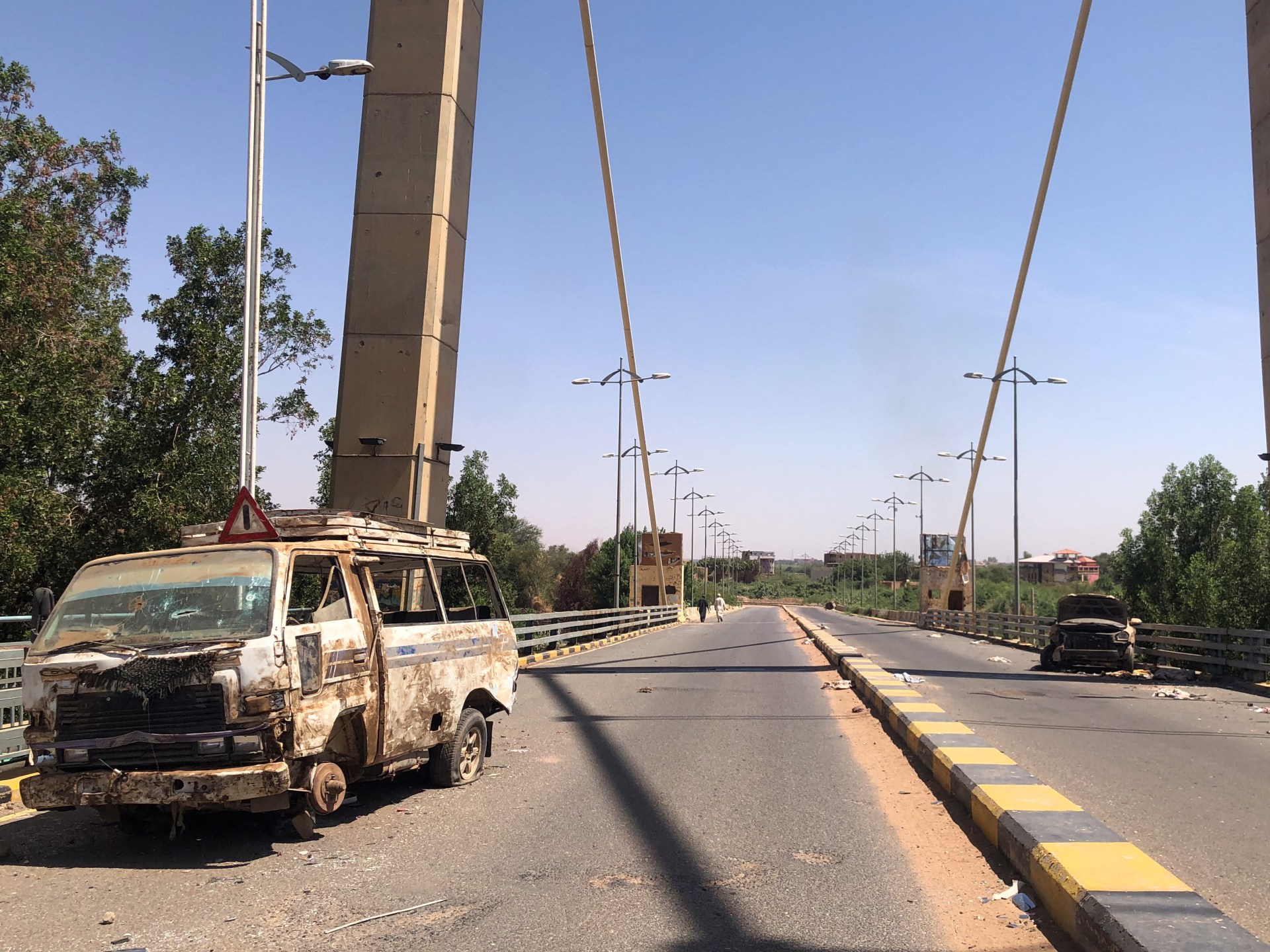
The paramilitary force has been blamed for attacks on a prison in el-Obeid and a displacement camp in Darfur.
At least 33 people have been killed in Sudan in attacks suspected to have been carried out by the paramilitary Rapid Support Forces (RSF) as the brutal two-year war claims its latest victims.
An RSF strike on a prison on Saturday in el-Obeid killed at least 19 people, while on Friday evening, at least 14 members of the same family were killed in an air attack in Darfur, local sources said.
The attacks – part of the RSF’s ongoing war with the military-led government’s Sudanese Armed Forces (SAF) since 2023 – came after six straight days of the paramilitary group’s drone attacks on the army-led government’s wartime capital of Port Sudan.
These attacks damaged key infrastructure, including a power grid and the country’s last operational civilian airport, which was a key gateway for aid into the war-ravaged nation.
The war has left tens of thousands dead, displaced 13 million people and triggered what the United Nations calls the world’s worst humanitarian crisis.
The attack on the prison on Saturday also wounded 45 people, a medical source told the AFP news agency. The source said the jail in the army-controlled city in the North Kordofan state capital was hit by an RSF drone.
The night before, 14 people were killed at the Abu Shouk displacement camp near el-Fasher in Darfur, a rescue group said, blaming the paramilitary.
The camp “was the target of intense bombardment by the Rapid Support Forces on Friday evening”, said the group of volunteer aid workers.
The camp near el-Fasher, the last state capital in Darfur still out of the RSF’s control, is plagued by famine, according to the UN.
It is home to tens of thousands of people who fled the violence of successive conflicts in Darfur and the conflict that has been ripping Africa’s third-largest country asunder since 2023.
The RSF has shelled the camp several times in recent weeks.
Abu Shouk is located near the Zamzam camp, which the RSF seized in April after a devastating offensive that virtually emptied it.
RSF escalation
Elsewhere on Saturday, SAF warplanes struck RSF positions in the Darfur cities of Nyala and el-Geneina, destroying arms depots and military equipment, a military source told AFP.
The RSF has recently said it had taken the strategic town of al-Nahud in West Kordofan, a key army supply line to Darfur.
The RSF’s escalation in Port Sudan earlier this month came after the military struck the Nyala airport in South Darfur, where the RSF receives foreign military assistance, including drones. Local media stated that dozens of RSF officers were killed in the attack.
Sudan’s army-aligned authorities accuse the United Arab Emirates of supplying those drones to the RSF, which has no air force of its own.
The war began as a power struggle between SAF chief Abdel Fattah al-Burhan and his former deputy, RSF commander Mohamed Hamdan Dagalo. It has effectively divided the country into two, with the army controlling the north, east and centre, while the RSF and its allies dominate nearly all of Darfur in the west and parts of the south.
Both sides have been accused of committing war crimes.
-
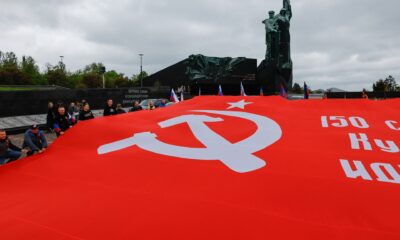
 Conflict Zones2 days ago
Conflict Zones2 days agoRussia-Ukraine war: List of key events, day 1,170 | Russia-Ukraine war News
-
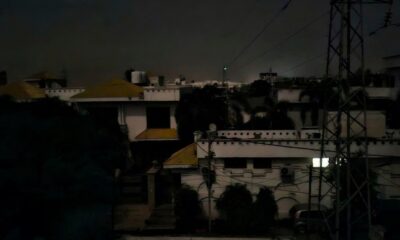
 Conflict Zones2 days ago
Conflict Zones2 days ago‘Missiles in skies’: Panic in Indian frontier cities as war clouds gather | India-Pakistan Tensions News
-

 Europe2 days ago
Europe2 days agoPope Leo XIV urges cardinals to make themselves ‘small’ in first mass as pontiff
-

 Middle East1 day ago
Middle East1 day agoSyria’s Druze divided as sectarian tensions linger after violence | Syria’s War News
-
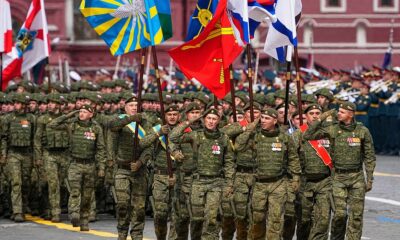
 Africa1 day ago
Africa1 day agoRussia stages massive victory day parade, Putin hails troops in Ukraine as foreign leaders attend
-
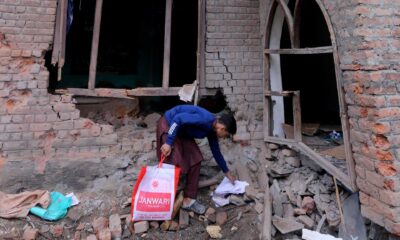
 Conflict Zones1 day ago
Conflict Zones1 day ago‘Slippery slope’: How will Pakistan strike India as tensions soar? | India-Pakistan Tensions News
-

 Europe1 day ago
Europe1 day agoUkraine’s Western allies pile pressure on Putin, threatening sanctions if he refuses 30-day truce
-

 Lifestyle1 day ago
Lifestyle1 day agoTwo dolls instead of 30? Toys become the latest symbol of Trump’s trade war




